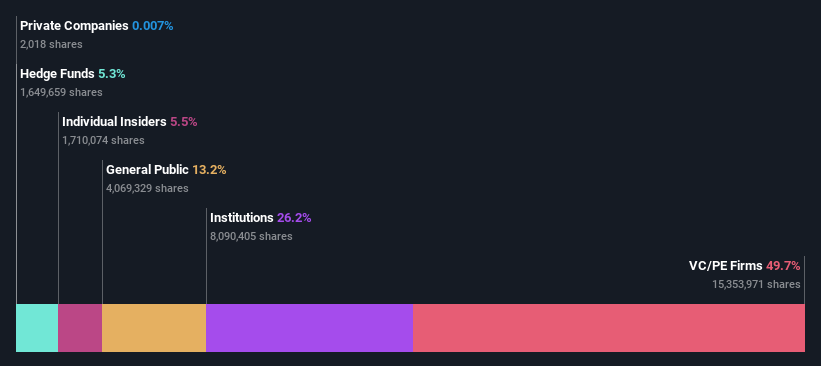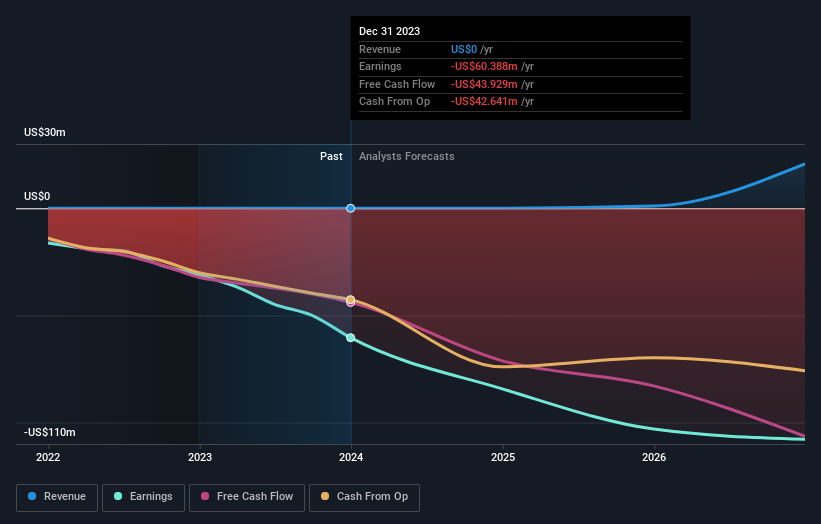Key Insights
-
Significant control over Acrivon Therapeutics by private equity firms implies that the general public has more power to influence management and governance-related decisions
-
The top 3 shareholders own 57% of the company
To get a sense of who is truly in control of Acrivon Therapeutics, Inc. (NASDAQ:ACRV), it is important to understand the ownership structure of the business. The group holding the most number of shares in the company, around 50% to be precise, is private equity firms. Put another way, the group faces the maximum upside potential (or downside risk).
And institutions on the other hand have a 26% ownership in the company. Insiders often own a large chunk of younger, smaller, companies while huge companies tend to have institutions as shareholders.
Let’s delve deeper into each type of owner of Acrivon Therapeutics, beginning with the chart below.
View our latest analysis for Acrivon Therapeutics
What Does The Institutional Ownership Tell Us About Acrivon Therapeutics?
Institutions typically measure themselves against a benchmark when reporting to their own investors, so they often become more enthusiastic about a stock once it’s included in a major index. We would expect most companies to have some institutions on the register, especially if they are growing.
We can see that Acrivon Therapeutics does have institutional investors; and they hold a good portion of the company’s stock. This can indicate that the company has a certain degree of credibility in the investment community. However, it is best to be wary of relying on the supposed validation that comes with institutional investors. They too, get it wrong sometimes. If multiple institutions change their view on a stock at the same time, you could see the share price drop fast. It’s therefore worth looking at Acrivon Therapeutics’ earnings history below. Of course, the future is what really matters.
Our data indicates that hedge funds own 5.3% of Acrivon Therapeutics. That catches my attention because hedge funds sometimes try to influence management, or bring about changes that will create near term value for shareholders. Looking at our data, we can see that the largest shareholder is RA Capital Management, L.P. with 27% of shares outstanding. Perceptive Advisors LLC is the second largest shareholder owning 17% of common stock, and Chione Ltd holds about 12% of the company stock. Furthermore, CEO Peter Blume-Jensen is the owner of 4.0% of the company’s shares.
A more detailed study of the shareholder registry showed us that 3 of the top shareholders have a considerable amount of ownership in the company, via their 57% stake.
Researching institutional ownership is a good way to gauge and filter a stock’s expected performance. The same can be achieved by studying analyst sentiments. There are plenty of analysts covering the stock, so it might be worth seeing what they are forecasting, too.
Insider Ownership Of Acrivon Therapeutics
The definition of an insider can differ slightly between different countries, but members of the board of directors always count. Company management run the business, but the CEO will answer to the board, even if he or she is a member of it.
Insider ownership is positive when it signals leadership are thinking like the true owners of the company. However, high insider ownership can also give immense power to a small group within the company. This can be negative in some circumstances.
Shareholders would probably be interested to learn that insiders own shares in Acrivon Therapeutics, Inc.. It has a market capitalization of just US$254m, and insiders have US$14m worth of shares, in their own names. It is good to see some investment by insiders, but it might be worth checking if those insiders have been buying.
General Public Ownership
With a 13% ownership, the general public, mostly comprising of individual investors, have some degree of sway over Acrivon Therapeutics. While this group can’t necessarily call the shots, it can certainly have a real influence on how the company is run.
Private Equity Ownership
With a stake of 50%, private equity firms could influence the Acrivon Therapeutics board. Some investors might be encouraged by this, since private equity are sometimes able to encourage strategies that help the market see the value in the company. Alternatively, those holders might be exiting the investment after taking it public.
Next Steps:
It’s always worth thinking about the different groups who own shares in a company. But to understand Acrivon Therapeutics better, we need to consider many other factors. For instance, we’ve identified 4 warning signs for Acrivon Therapeutics (2 make us uncomfortable) that you should be aware of.
Ultimately the future is most important. You can access this free report on analyst forecasts for the company.
NB: Figures in this article are calculated using data from the last twelve months, which refer to the 12-month period ending on the last date of the month the financial statement is dated. This may not be consistent with full year annual report figures.
Have feedback on this article? Concerned about the content? Get in touch with us directly. Alternatively, email editorial-team (at) simplywallst.com.
This article by Simply Wall St is general in nature. We provide commentary based on historical data and analyst forecasts only using an unbiased methodology and our articles are not intended to be financial advice. It does not constitute a recommendation to buy or sell any stock, and does not take account of your objectives, or your financial situation. We aim to bring you long-term focused analysis driven by fundamental data. Note that our analysis may not factor in the latest price-sensitive company announcements or qualitative material. Simply Wall St has no position in any stocks mentioned.






